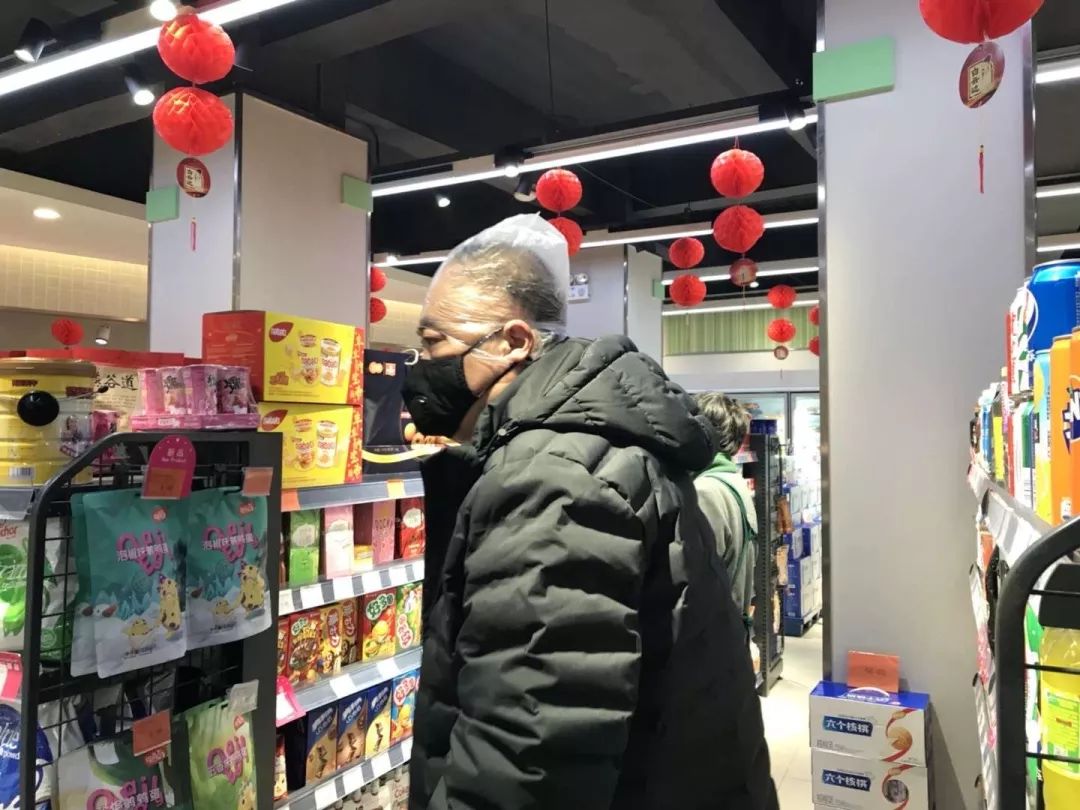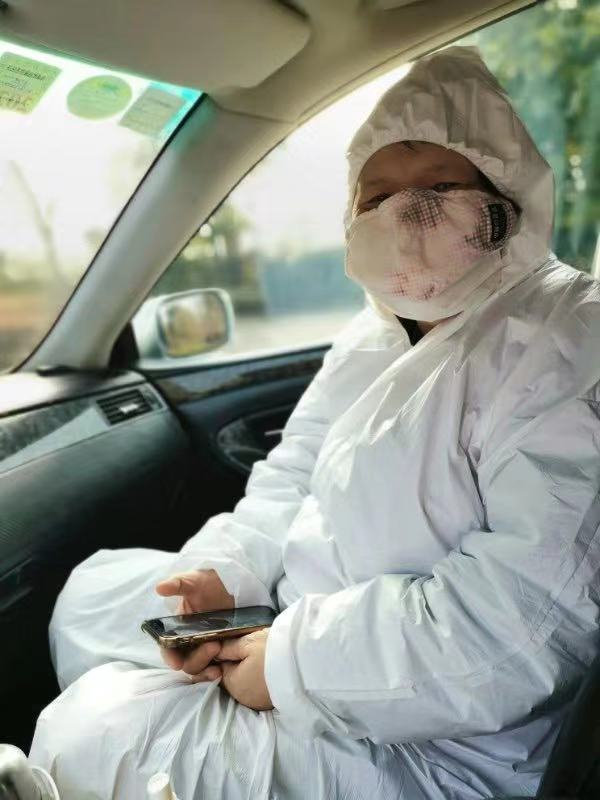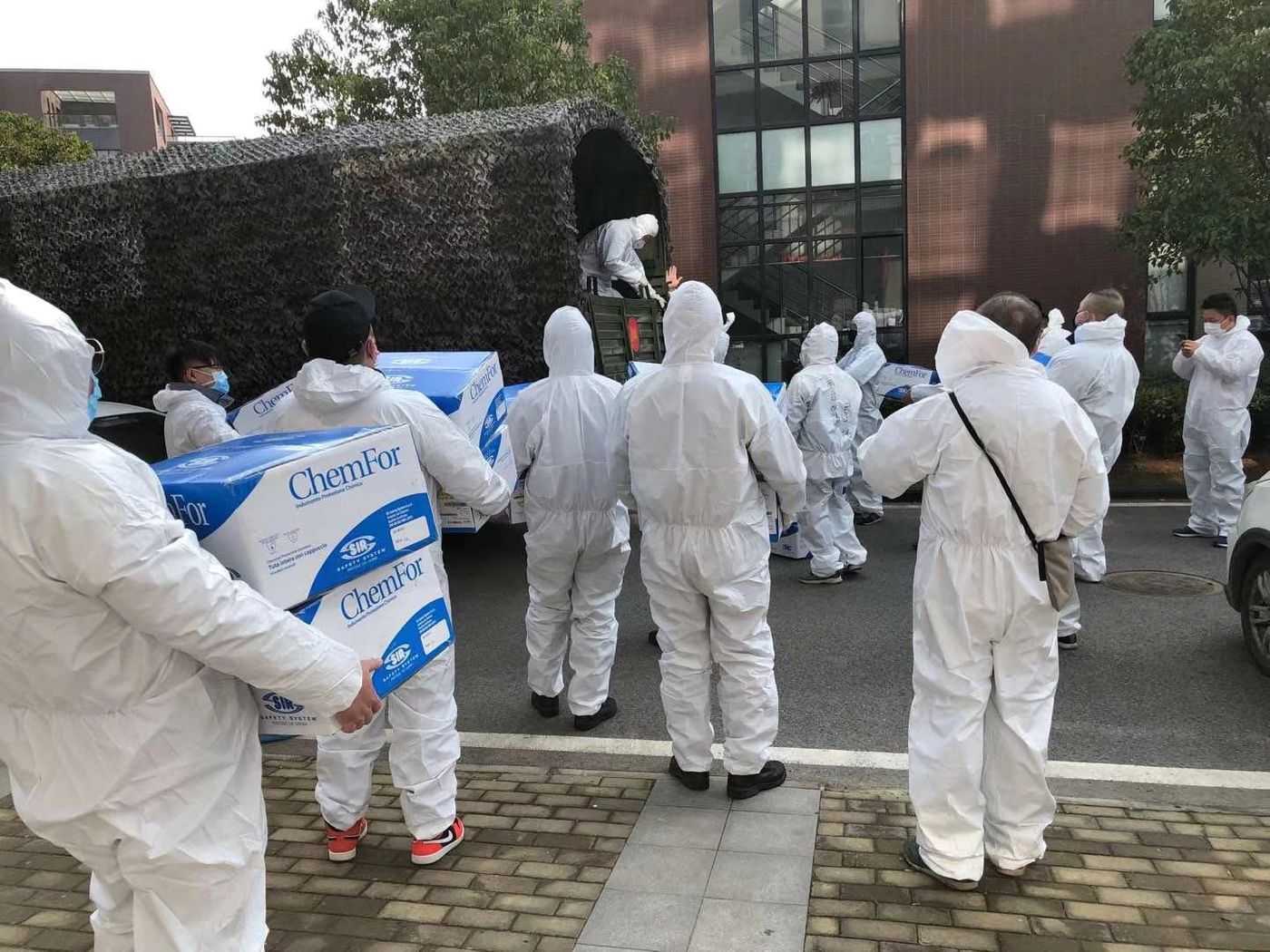
Slogan on the street: ‘Stop the disease scientifically. Do not panic. Do not let rumors make the situation worse.’ (Photo credit: Guo Jing.)
The following post is the second in a series of diaries written by independent filmmaker and feminist scholar Ai Xiaoming and feminist activist Guo Jing. Both are living in Wuhan at the center of the COVID-19 pandemic. You can read the first part of the series here.
This second installment was written between January 29 – February 4, 2020. The original Chinese diaries are published on Matter News.
Check out Global Voices’ special coverage of the global impact of COVID-19.
Guo Jing: January 29, 2020
工作现在是很多人的担忧。春节假期现在延长到了2月2日,可是如果疫情还在继续发展,人们怎么可能安心地返工。大公司可能有足够的财力维持运营,延长假期给一些小企业和个体户带来的损失更严重,他们的盈利可能并不多,会有房租的压力,给员工发工资的压力,就可能会裁员。在裁员中,女性经常是首先被裁掉的员工。
对于个人,大家会在考虑要不要冒着一定风险去上班,他们中可能有人面临房贷的压力,有人要照顾家庭。如何解决这些问题?
Many people are worried about their jobs. The Chinese New Year holidays were extended to Feb 2. However, if this infectious disease keeps spreading, how can we feel safe to return to work? The big companies might have sufficient financial resources to keep their operations going. However, for those small companies and businesses, the extended holidays will bring serious financial stress as their businesses generate less profit while they still need to pay for rent and their employees’ salaries. It would lead to the laying off of employees and females are usually the first on that list.
As for individuals, we have to ponder whether we should risk going to work. Some may have the pressure of paying their mortgage. Some may have family burdens. How to deal with all these issues?
Guo Jing: January 30, 2020

A man put a plastic bag on his head for protection in a supermarket. (Photo credit: Guo Jing.)
小心翼翼地生活是反人类的。
每天花很多时间做一些防护措施我有点厌烦。每天要保证通风,前几天天气阴冷又担心感冒。我是一个怕麻烦的人,日常生活并没有那么讲究。我小时候生活在农村,对食物的态度是“不干不净吃了没病”。食物尚且如此,对衣物就更不会那么在意。如果不出门,我会好几天不洗头。我开始觉得自己有点过度清洁,这两天就没有拖地。
昨天的晚餐是炒土豆茄子加稀饭。我感到很疲惫,不太有胃口,做完晚饭半天我都没有动筷子。这种疲惫感更多的来自心底深处的无力。
It is against human nature to live in such a meticulous manner.
I am tired of spending so much time on guarding myself from the disease. I need to ventilate my apartment everyday. However, as the weather was cloudy and cold several days ago, I was worried that I would catch a cold. I am a carefree person and pay little attention to triviality. I lived in the countryside when I was a kid, and my attitude toward food is “the cheap food is good for our health.” Neither do I care about my outfits. If I do not go out, I can keep my hair unwashed for several days. But now, I feel I am a bit obsessed with housekeeping and feel uneasy as I did not mop the floor yesterday and today.What I cooked for dinner yesterday is porridge and fried potatoes and eggplants. I did not pick up my chopsticks upon cooking. I felt very tired and lost my appetite. The tiresome feeling comes from feeling powerless.
Guo Jing: January 31, 2020
在封城后,武汉的一些医院公开向社会募捐,很多志愿团体动员社会力量为医院运输物资。后来,政府开始接管募捐工作,声称为了避免公众被骗,于是指定了5个官方机构来协调募捐工作。可是湖北红会加分配的工作人员一共六十多人,对接整个湖北的医院。
武汉慈善总会收到400多万人的5亿多捐款,昨天都还1分钱未花。从海外寄来的医用物资,海关会要求联系慈善总会或者红十字会才能过关。
After the lockdown, some hospitals in Wuhan started making public calls for donations and many volunteer groups mobilized citizens to collect and deliver medical necessities to these hospitals. Later, the government took over the work and claimed that people might be cheated (by fake volunteer groups). The government then designated five official organizations to coordinate donations. However, there are only about 60 staff members in the Red Cross in the province of Hubei, and they are assigned to work with all hospitals in the Hubei. [Editor note: Wuhan is the capital city of Hubei, and the city alone has 128 hospitals.]
The Wuhan Benevolent General Association has received a 5 billion Yuan donation from more than 40 million people, but till now they did not spend a cent to help ones in need. Regarding those medical necessities sent from overseas, customs will keep the goods on hold until Wuhan Benevolent General Association or the Red Cross reaches out to them.
Guo Jing: February 1, 2020
今天早上突然发现,我桌子上的日历停在1月22日。我现在无法有计划,我甚至都不知道明天会怎样,只能尽力去过好每一天。
This morning, I noted that the calendar on my desk stopped on Jan 22. I cannot do any planning now. I do not even know what will happen tomorrow. I can only do my best to carry on my life everyday.
Ai Xiaoming: February 1, 2020

Ai Xiaoming in her gear when she went to hospitals with volunteers to deliver protective suits. (Photo credit: Ai Xiaoming.)
我隨行了志願者團隊。1月29日,跟15輛私家車,往21個醫院和單位,送了約6500件防護服。
如果我去醫院,會戴一個 N95口罩,外面再套一個一次性的口罩。回來以後,我沒有扔掉那個N95的口罩。我洗了後放到電水壺裏煮,煮完了然後放在電暖器上給它烤乾了。其實我覺得是很可笑的,一次性口罩拿去洗,那不是很可笑嗎?但是你想一想,這口罩咱們一般買不到。
我們送去的醫院醫生也是這樣,说你再沒有防護服送来,醫生護士都沒法查房了。做不到用一次就扔,醫生都是紫外線照一下,重複穿。
如果封城時間延續下去,可能後面的困難就會比較多了,因為匱乏的情況會越來越多。接下來進入日常生活,老年人的常用藥怎麼辦,醫院能不能開到常用藥也不知道,因為如果連口罩都缺乏的話,沒有物流的話,後面的生活就很難想象。
我們家貓的貓糧吃完了,我現在訂的貓糧也沒到。 目前我們就是維持一個脆弱的平衡。
我認為目前恐慌帶來的問題和危機,比疫病更兇險,因為恐慌造成的人和人之間的隔離…昨天我們看到一個消息,因為要隔離一個被感染的父親,他腦癱的長子被留在家裏無人照顧,幾天後死了。在這種社會心理的狀態下,我覺得死去的腦癱孩子就像一個隱喻,预示在這種極度的隔絕下會發生什麽樣的悲劇。
I went to some hospitals with a volunteer group on Jan 29. We had 15 private cars, and we went to 21 hospitals and organizations. In total we delivered around 6500 protective suits.
If I go to a hospital, I wear a N95 mask and use a medical mask to cover it. After I return home, I do not throw away that N95 mask. I boil the N95 mask in an electric kettle and dry it above an electric heater. It is indeed very funny to wash a single-use mask, isn’t it? But think again. It is difficult to buy a N95 mask now.
The medical doctors in those hospitals that we visited also told us that if we did not give them that protective gear, the doctors and nurses could not do the ward rounds anymore. They cannot afford to throw away the disposable protective gear and the doctors usually use UV light to disinfect them so that they can wear them repetitively.
If the lockdown extends, it will become more and more difficult, because more and more people will face the shortage of necessities. What if the elderly people run out of their medicine? We do not know if the hospitals can still prescribe those drugs. If we do not have masks and delivery services, it is very difficult to imagine how we can get through it.
The food for my cat is running out, and the cat food that I ordered was not been delivered to me yet. Our status is in a fragile balance.
The problems and crisis brought by panic is more dangerous than the disease itself, because panic isolates people. Yesterday, I saw this news: an infected father was put under forced-quarantine and his oldest son, who suffers from cerebral palsy, was left alone at home and died several days later. In this kind of sociopsychological condition, I feel this dead child with cerebral palsy is a metaphor for the current social psychology — it is the kind of tragedy that could happen in extreme isolation.

The volunteers delivered protective suites to hospitals. (Photo credit: Ai Xiaoming.)
Guo Jing: February 3, 2020
每天出门成为我的一个重要日常。其实我已经觉得出门不是必要,可我还在偏执地坚持。
我在坚持什么?这个城市不会在明天突然解封,外面不会在一日之内发生翻天覆地的改变。
这其实是一个微小的反抗,在信息的封锁中寻找真实的信息,在隔离中寻求和他人的联系,在不确定中寻找某种确定性。
Going out every day becomes my important routine. Actually, it is not necessary for me to go out, but I stubbornly keep this routine.
What do I insist on this? This city will not stop lockdown tomorrow. The world outside will not change overnight.
This action is my private resistance. I am looking for real information when information is blocked. I am looking for connections with others in isolation. I am looking for something certain when everything is uncertain.
Guo Jing: February 4, 2020
前几天看到一个人发的朋友圈,写道:“封城封村的消息才几天,有多少男的在一个快被急疯的状态,试想一下有多少女的一年四季都是这样的日子。”
封锁一定程度上让男性体会了女性缺乏公共生活的感受。很多已婚女性在结婚后开始不得不围绕着家庭,即便她们有全职工作,下班后她们洗衣做饭、照顾孩子,做了很多不被重视的家务劳动。她们公共性的生活不断缩减,跟同事、朋友谈天的时间越来越少,她们对家庭的投入多于对自己的关注。
晚上和我的朋友们聊天。前一天成都发生了地震,我们就聊到了08年的汶川地震。…我们重新审视了集体主义和英雄主义。在灾难面前,我们塑造一味奉献的英雄,贬低所谓“自私”的行为,而事实上很多看似自私的行为只是人们的自保而已。集体主义具有很强的情绪渲染力,甚至会制造厌恶甚至仇恨,比如中国人讨厌日本人。这种情绪会让我们忽略人本身。
很庆幸我们今天除了赞美医护人员的付出,也看到他们的脆弱。
Several days ago, I saw a friend’s message on my social circle. She wrote, “Many men become very irritated in these days after the lockdown. Can they imagine that many women have been living this kind of life year after year?”
The lockdown, to some degree, let the men experience the feeling that so many women have experienced: the lack of public life. Many married women are trapped in their families. Even if they have a full-time job, they need to wash clothes, take care the children, and do a lot of housework. Their public life has been shrinking. They have less time to talk to their colleagues and friends. They pay more attention to their families than to themselves.
Tonight I chatted with friends. Yesterday there was an earthquake in Chengdu, so we talked about the Wenchuan earthquake back in 2008… We discussed aspects surrounding collectivism and heroism. When facing a tragedy, we tend to see the act of self-sacrifice as heroic and look down on so-called ‘selfish’ behaviors. However, people also rely on these seemingly selfish behaviors to survive. Collectivism has a strong influence on our emotions, and sometimes it can spread antagonism or even hatred. For example, [nationalism has] antagonized Chinese and Japanese people. Such sentiment makes us ignore other aspects of humanity.
I am glad that today when we praise medical staff we see their fragility too.
Check out Global Voices’ special coverage of the global impact of COVID-19.







